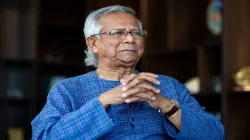Bangladesh interim govt led by Nobel laureate Muhammad Yunus to be sworn in today: Army Chief
Nobel laureate Dr Muhammad Yunus was appointed as the head of the interim government, a day after Sheikh Hasina left the country on August 5.

Amid ongoing political turmoil in Bangladesh, Army Chief General Waker-Uz-Zaman announced that an interim government, led by Nobel Laureate Professor Muhammad Yunus, is set to be sworn in on Thursday (August 8). Speaking at a press conference, General Waker confirmed that the swearing-in ceremony is likely to take place at 8:00 pm (local time), The Daily Star reported. The Army Chief also revealed that the advisory council of the interim government may consist of 15 members, although the final details are still being finalised. He further noted that the situation across the country is improving significantly, which is a positive sign for the stabilisation of the nation.
Earlier on Tuesday (August 6), Bangladesh President Mohammed Shahabuddin had dissolved Parliament on Tuesday and appointed Nobel laureate Mohammad Yunus as the head of an interim government. The decision was made in a meeting President Shahabuddin had with chiefs of the three services and a 13-member delegation of the Anti-Discrimination Student Movement at Bangabhaban (presidential palace).
Yunus welcomes ouster of Sheikh Hasina’s regime
The Anti-Discrimination Student Movement that spearheaded the massive protests has earlier said that 84-year-old Yunus had agreed to head the interim government. Yunus is currently out of the country but welcomed the ouster of Sheikh Hasina’s regime, describing the development as the “second liberation" of the country. Yunus won the Nobel Peace Prize in 2006 for his anti-poverty campaign through the Grameen Bank, a model replicated across continents.
Who is Muhammad Yunus?
Yunus was awarded the Nobel Peace Prize in 2006 for pioneering microcredit to help impoverished people, especially women, while the Grameen Bank, which he had founded, also secured the prize on the same occasion. He faces over 150 other cases, including major corruption charges that could see him jailed for years if found guilty while the economist denies all wrongdoing. Yunus entered Bangladeshi politics in 2007 by forming his Nagorik Shakti (Citizen Power) party and planned to contest the upcoming election amid a state of emergency and severe conflict between Sheikh Hasina's Awami League and Khaleda Zia's Bangladesh Nationalist Party (BNP). He dropped his efforts to establish the party after a lack of support but has maintained his fierce criticism of Hasina's government.
Bangladesh protests
It should be noted here that the protests began peacefully as frustrated students demanded an end to a quota system for government jobs, but the demonstrations have since morphed into an unprecedented challenge and uprising against Hasina and her ruling Awami League party. So far, at least 440 people have been killed and more than 11,000 people arrested in the violence-ridden nation. Bangladesh is also facing a fluid political situation as of now with Sheikh Hasina resigning from her post in the wake of mounting protests.
ALSO READ: Khaleda Zia's first statement after release: 'We have to build democratic Bangladesh' | WATCH